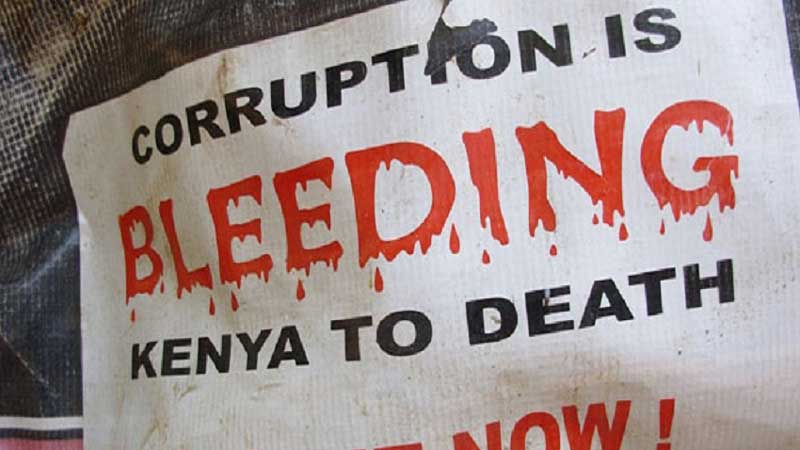[dropcap]O[/dropcap]ne thing Kenyans concur on is the existence of corruption but what we tend to avoid is its entrenchment into the social and economic development and uprooting the former to which the latter mostly depends can be a daunting task.
Kenya’s version of corruption has got much to do with the display of opulence of the white settlers Kenyans of the time believed was a perfect precept of civilisation.
The burning desire by the settlers to attain a high social stratification in the shortest time possible and once the British left, opulence became the template of respect.
Those familiar with the colonial working procedures know that the British administrative matrix and efficacy is overly based on civic culture, expertise and rectitude which, after independence, our elites were able to manipulate easily to steal from the State as they wished.
In the process, they introduced several layers of eclectic procedures (red tape) to obfuscate paper trail and accountability, thus making it difficult for any astute sleuths to know where the buck stops.
The oversight policy broke down when the middle and the lower cadre officials also contrived their own mode of stealing and the class struggle found its way into our social economic fabric.
Role model
As opposed to their compatriots in the administrators, who came from the landed gentry and well-educated the white settlers – the beneficiaries of the land expropriation were people from dubious background and questionable probity.
They were people drawn mainly from farm workers, servicemen discharged from the army, and delinquents banished by their parents. They had a one-way ticket and most of them, emaciated.
The intractable economic hardship caused by the two world wars necessitated the relocation of the unproductive and unskilled people, which was a relief to the government and good riddance to the law-abiding citizens.
Once they settled on swaths of land, the so-called settlers began to masquerade as aristocrats. They connived with unscrupulous cartels in Britain to dispatch shiploads of young women including sluts they promised a utopian life in their new fiefdom.
Related: David Munyakei: The man who first exposed mega corruption in Kenya
Unaware of what awaited them, the women found themselves trapped in vicarious excitements of people obsessed with ostentatious lifestyle, partners swapping, bar brawls and all sorts of despicable binges all of which are well documented in non-fiction books such as The Soul of White Folk authored by Brett Shades, White Mischief by James Fox, etc.
To Kenyans of that time, the deplorable lifestyle of the white community was indeed the epitome of civilisation everybody envied and aspired to adopt once the colonial government relinquished the instruments of power to the natives.
Corruption trail
Like the white settlers, Kenya’s first president, Jomo Kenyatta and his liberation colleagues took over the leadership of the country with nothing to their name.
As new elites, their priority was to relocate from Eastlands to the leafy suburbs dominated by the white folks as soon as possible. Obsessed with the aura of elitism, their second priority was storm social clubs they were previously not allowed entry. And this required money they did not have.
The class division between the African themselves took a centre stage as those stuck in the Eastlands became the barometer for gauging social status and success.
Eager to pacify and confer financial benefits to those coalescing around him, Mzee Jomo Kenyatta began to split and create more government ministries and carved out some departments to establish parastatals most of which were headed by ethnic kinsmen and loyal political allies.
This was followed by a policy compelling foreign companies to allocate some shares to indigenous Kenyans who happened only to be the president’s family members. The young bourgeoisie, some as young as 26 years old or below, were appointed CEOs of the outfits and legacy of their notoriety and opulence is still fresh in the minds of many. Some of the companies either collapsed, contracted or relocated to other countries.
Faced with public outrage over escalating corruption and tribalism in government in 1968, Kenyatta began to suppress dissent and more so after Tom Mboya’s murder in July 1969. His ethnic group formed an impenetrable ring around him and he became a revered dictator and not liberator.
He went further and set a commission to deliberate on a raft of issues including that which touched on public servants’ engagement in private business. The Commission was chaired Mr Duncan Ndegwa, who doubled up as a business mogul and Governor of Kenya’s Central Bank.
And as was predicted, the Ndegwa commission report did not only discard the civil service code but gave state officials unlimited latitude to exploit their privileges, citing their low remunerations as the justification to trash integrity to make more money in any kind of business.
Upon taking over the reign of power in 1978, Daniel arap Moi adopted Kenyatta’s policy in its entirety and perfected the prevailing pattern. He hounded out Kenyatta’s intractable coteries and created more parastatals for his ethnic community members in total disregard of the dynamics of national economic growth at the time.
In 2015, there was a proposal to reduce the number to 79, down from over 300.

It is in public domain that some of the blue-eyed elites who served in Jomo’s regime or Moi’s or both are the key players in Kenya’s economy today. Thanks to their ingenuity of corruption, together with the Asian tycoons beholden to them, they control a substantial percentage of the private capital absorbing a large number of Kenya’s workforce.
Mwai Kibaki’s pledge of zero tolerance to graft was short-lived after it emerged that members of his kitchen cabinet were engrossed in impropriety, forcing his anti-corruption czar, John Githongo to flee the country and leave his boss to his own devices just after two years in office.
At least Kibaki had the will to stem the vice but realised soon after how insurmountable the exercise was. This why the ordinary Kenyans are baffled to see politicians jostling to pay homage not to Kibaki but to Moi, a man harshly remembered for brutality and perfecting graft.
President Uhuru Kenyatta’s obsession with fighting grand corruption depicts him as insensitive to the plight of ordinary citizens. The recent crackdown at the Kenya Revenue Authority notwithstanding, government officials in the lower cadres continue to extort from poor Kenyans millions of shillings daily country-wide.
The Department of Immigration remains a thorn in the flesh to the public. Some in the Diaspora have had their future shattered or rendered stateless for resisting kickback demands.
Despite the rigmarole of filing for pension, the government seems unconcerned about the pain retirees are subjected to at the NSSF even after mortgaging their possessions for kickbacks. Some die before receiving a cent.
Even though the Director of DCI is perceived to be doing a sterling job, the department he is leading is part and parcel of the National Police Service known for stealing even from the dead. Taking top position in every corruption perception index, the department has become impervious to any mode of reforms and reshuffles are never a panacea.
[Also See: With zero high profile convictions, Kenya’s war on corruption falters]
As collector and custodian of evidence the police and their counterparts at the EACC can bungle and scuttle a case at any stage for a fee as they have always done.
Furthermore, the in-explicit legal framework the Asset Recovery Agency is using to mop up stolen money is a recipe for capital flight to the neighbouring countries with devastating effect on the economy like Somalia.
The fact remains that stolen money is a factor in our economic activities. It stimulates demand in very business sectors, including banking, which the taxman depends on for revenues.
It is, therefore, foolhardy to ignore the genesis of our lifestyle and engage in a futile exercise of dismantling corruption using crude methods by the police without a fallback strategy for the victims (beneficiaries) and the villain (capital providers) and expect the economy to remain intact.












Leave a comment